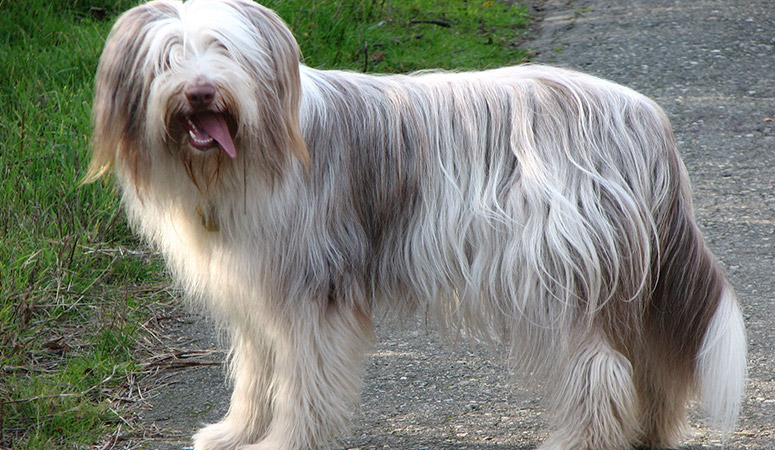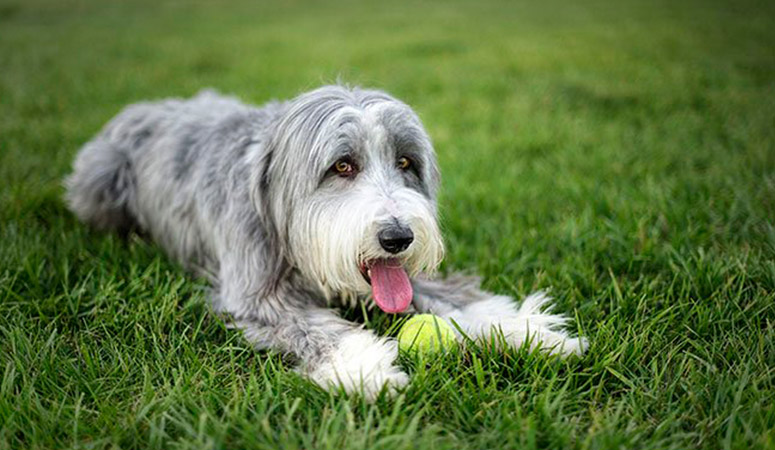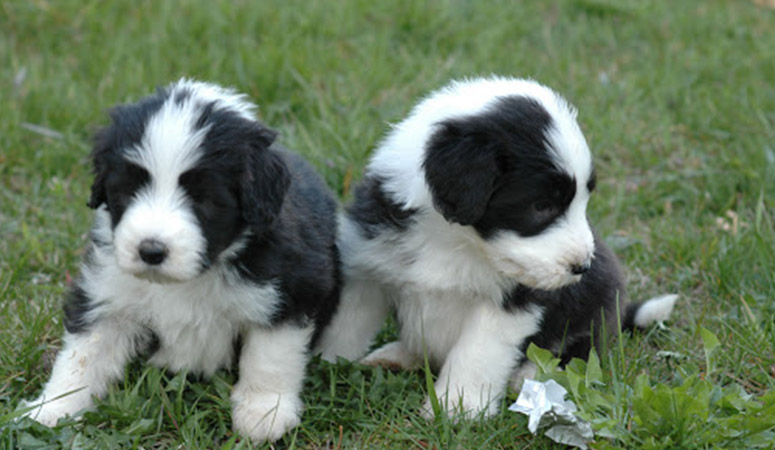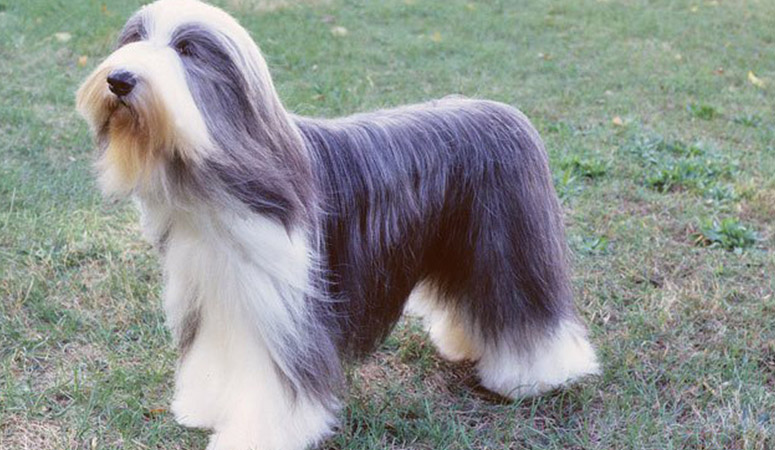Bearded Collie

The Bearded Collie leaves the impression of strength and agility with medium size and long, lean, strong body. As a sheep herding breed, he has the ability to make sharp turns, quick starts, and sudden stops, which can be kept for a long period under all conditions. Independent and friendly, they are enthusiastic companions of the family.
| Other Names | Beardie |
| Color | Black, Blue, Brown, or Fawn, with White Markings |
| Height | Males: 21-22 inches. Females: 20-21 inches. |
| Weight | Males: 40-60 pounds. Females: 40-60 pounds. |
| Life Span | 12-14 years |
| Personality | Smart, Bouncy, Charismatic |
| Exercise | Regular Exercise |
| Origin |
| Popularity | #136 |
| Groom Needs | Daily Brushing |
| Kids Friendly | Yes |
| Dog Friendly | Yes |
| Watch Dog | |
| Family Dog | Yes |
| Litter Size | 4-12 pups |
Bearded Collie Pictures
Bearded Collie Video
Introduction
The Bearded Collie doesn’t appear stocky but it is strongly built, with a long body that is nicely trimmed. They are medium-sized dogs bred originally for their exceptional herding characteristics. Beardies are known for being playful, energetic, and boisterous. Like many other breeds, early training is required to keep them under control. They come in a shaggy double coat, abundant facial hair, and an upbeat spirit. Bearded Collies have color varieties of black, fawn, brown, or blue with markings of tan or white.
As typical medium-sized dogs, standard Beardies are likely to stand 20-22 inches at the shoulder, regardless of gender, and weigh between 45 and 55 pounds at the weighing scales. They make reasonable companions and get along with children. Bearded Collies have an average lifespan of 11-14 years.
Living with Bearded Collie
With long double coat, Beardies shed heavily once a year for two to four weeks. Along with time devoted to coat care, be prepared for dirt, mud, and debris tracked in on the dog’s furry feet. A light trim may lessen the mess a bit and gives the feet a neat appearance.
Begin accustoming your Beardie to being brushed and examined when he’s a puppy. Make grooming a positive experience filled with praise and rewards, and you’ll lay the groundwork for easy veterinary exams and other handling when he’s an adult.
The Bearded Collie requires weekly brushing with a bristle or pin brush to remove tangles and mats and reduce shedding. Mist the coat with a conditioning spray before brushing to reduce static and keep the hairs from breaking.
Bathe your Beardie every six to eight weeks or more often, particularly when his furry hindquarters become soiled with feces.
Nails should be trimmed weekly or only monthly to keep them short. Short, neatly trimmed nails help keep the dog’s feet in good condition and keep your legs from getting scratched when your bouncy Beardie enthusiastically jumps up to greet you. Handle his paws frequently, as dogs are touchy about their feet and often look inside his mouth and ears.
Brush your Beardie’s teeth at least two or three times a week to remove tartar buildup and the bacteria that lurk inside it. Daily brushing is even better if you want to prevent gum disease and bad breath.
Ears should smell good, without too much wax or gunk inside, and eyes should be clear, with no redness or discharge.
Energetic and boisterous, Bearded Collie requires more than an hour of physical activity each day to remain healthy and to prevent problem behavior. They are adept at most dog sports and agility training. Bred to herd sheep, Beardies love to participate in athletic events such as herding, rally, agility, and obedience competitions.
With high energy, they need to be given a tremendous amount of mental stimulation too or they quickly get bored and this could lead to them becoming unruly and difficult characters to handle.
Beardies enjoy being with their people, whether they’re indoors or outdoors. They’ll be satisfied with a couple of half-hour walks or play sessions with a ball daily.
Beardies should spend a large portion of their day outdoors exercising, working, and playing. And they need some sort of activity every day, whether playing ball; a long walk, run, or hike. Beardies are happy to run and play outside no matter what the weather.
They benefit from having a large, enclosed yard where they can run around and play or other area with a companion, human or canine. Ensure it is secured, as the breed is prone to finding escape routes and wandering.
However, Bearded Collies puppies should not be given too much exercise because their joints and bones are still growing. Too much pressure on them could result in causing a dog a few problems later on in their lives. So jumping up or off furniture or running up and down the stairs should not be allowed, which puts too much pressure on their still growing joints and limbs.
The Bearded Collie should do well on a high-quality dog food, whether commercially manufactured or home-prepared with your veterinarian’s supervision and approval. But the diet should be appropriate to the dog’s age, size, activity level and metabolism. Recommended amount is about 1.5 to 2 cups a day, divided into two meals. Puppies eat 3 to 4 cups daily.
If you get a Bearded Collie puppy, you should follow the feeding schedule and stick to the same routine, feeding the same type of food to a puppy to avoid any tummy or digestive upsets. You should feed older dogs with a good quality, well-balanced diet to suit their ages and any health issues a dog may be suffering from.
Beardies are messy eaters because of the amount of hair they have around their muzzles. Food collects in the hair and if left it soon builds up, gets smelly, which could lead to a nasty skin infection if not cleaned.
Some dogs are prone to getting overweight, so watch your dog’s calorie consumption and weight level. Treats can be an important aid in training, but giving too many can cause obesity.
Clean, fresh water should be available at all times.
Learn about which human foods are safe for dogs, and which are not. Check with your vet if you have any concerns about your dog’s weight or diet.
Bearded Collies are generally healthy, but like all breeds of dogs, they’re prone to certain health conditions, such as hip dysplasia, hypoadrenocorticism, Von Willebrand’s disease, colonic disease and epilepsy. They may suffer from eye problems, including cataracts and progressive retinal atrophy. Not all Beardies will get any or all of these diseases, but it’s important to be aware of them if you’re buying or living with a Beardie.
As with all breeds, a Beardie’s ears should be checked regularly to remove foreign matter and avoid a buildup of wax, and the teeth brushed daily.
There are several health tests considerations specific to the breed, such as hip evaluation, ophthalmologist evaluation and thyroid evaluation.
Responsible breeders test all breeding stock for conditions that can affect the breed. Regular visits to the vet for checkups and parasite control help to ensure the dog a long, healthy life.
Total Annual Cost: $2889
Cost is estimated for the first year and may vary depending on many factors, such as dog food, health care, leash, collar, licensing, possible fencing, crates, training and obedience classes, dog-walking, grooming, treats, toys, flea, tick, and heart-worm meds, microchips, etc.
Bearded Collies are easy to train as they learn very quickly, but they do have a stubborn streak, so basic obedience can take some time.
Puppies should be properly socialized to develop the amiable, outgoing personality that is characteristic of the breed. As with all dogs, early exposing the puppy to a wide variety of people, places, and situations between the ages of seven weeks and four months will help him develop into a well-adjusted, well-mannered adult.
They’re successful in performance and companion events such as earthdog, barn hunt, obedience, and agility. While they excel in all dog sports, they enjoy showing off their herding skills most of all. Like many other Herding breeds, the Beardie was bred to work out in the field on his own without any direction from people.
Beardies may be difficult to house train, but crate training can help a lot. But you shouldn’t keep it in a crate for too long, or it may get bored and destructive.
The Bearded Collie responds best to a gentle, kind approach. They do not learn under abusive or harsh conditions. Keep lessons fun, short, and consistent, and your Beardie will learn the basics quickly. Begin training early and you will obtain excellent results.
History
The Bearded Collie had a rough job to handle while growing up in Scotland. Scottish farmers kept them to herd their livestock. They became acclimated with the strenuous mountainous ranges and Scottish highlands, earning themselves the names Highland Collies and Mountain Collies. They thrived in herding stock and driving them to market. The story of their descent features a Polish trader, Kazimierz Grabski, who was said to have traded a consignment of grains for sheep in Scotland, by ship. He had purchased some Polish Lowland Sheepdogs to assist in herding the flock. The story goes that a Scottish Shepherd developed an interest in the dogs and purchased a large number of them in exchange for sheep, and began to breed them.
Some paintings and pictures of the 18th century feature the Bearded Collie, serving as a testament to their long existence. The Polish Lowland Sheepdogs were subsequently bred with several Scottish breeds and probably with an exotic breed, the Komondorok. Several crosses stabilized the name Bearded Collie. The Bearded Collie had established its place in the show circuit when the First World War diminished what influence they had till they were almost extinct. However, the hiatus between the world wars was a regenerative era for the breed. British breeders had taken up the gauntlet to salvage this uncommon breed. Mrs. G. Olive Willison is credited with developing and improving the modern Bearded Collie in 1944 from crossing a dog thought to be a Shetland Sheepdog with a Bearded Collie. The first Bearded Collie puppies to be sired in the United States came in 1967, after which the American Kennel Club registered the Bearded Collie in its Studbook in 1977.
Helpful Information
Breed Club: BEARDED COLLIE CLUB OF AMERICA, INC.
Breed Club Link: http://www.bcca.us/
Breed Club Rescue: BCCA Rescue
Breed Club Rescue Link: http://beardedcollieclub.us/




